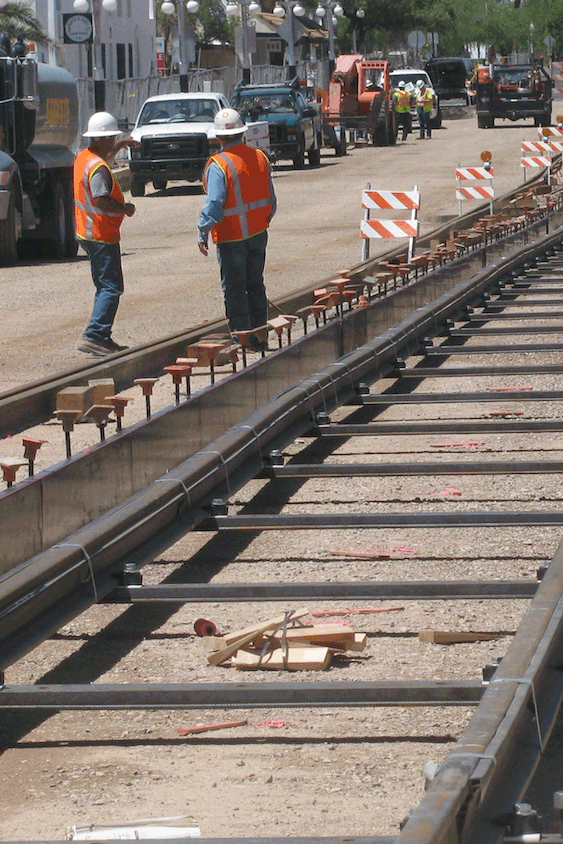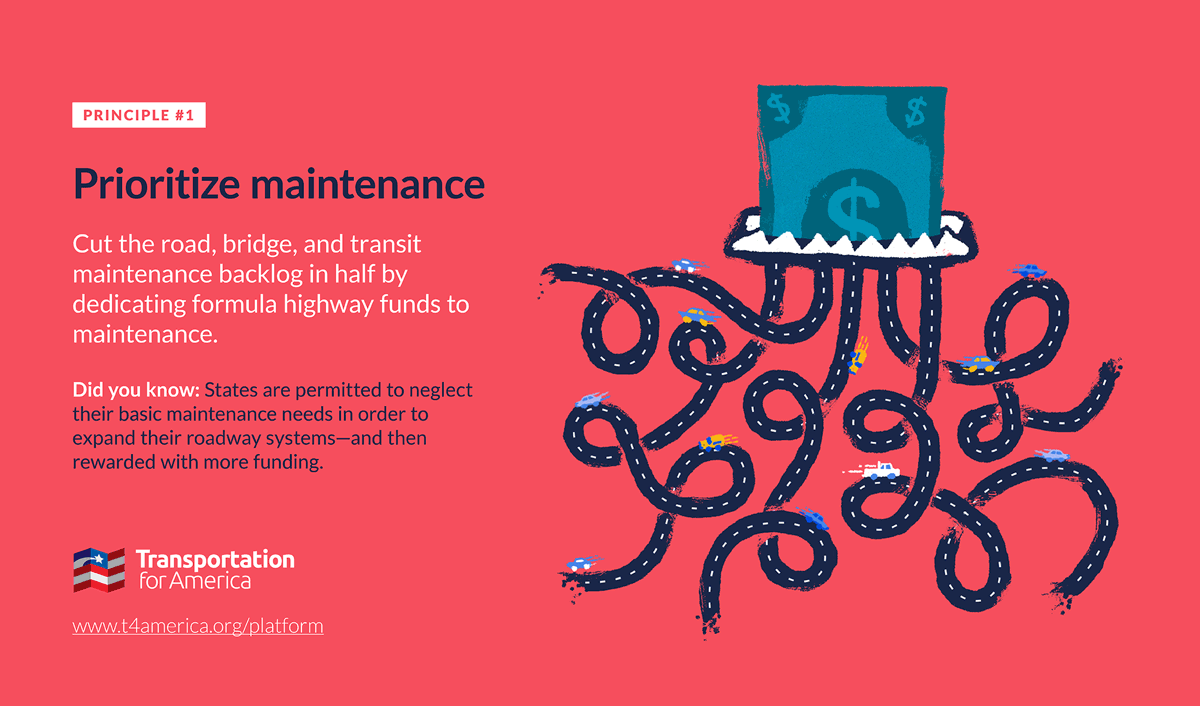Gov. Accountability Office: The FTA “runs the risk of violating federal law”
With the release last week of Stuck in the Station, we detailed how the Federal Transit Administration (FTA) has been delaying the distribution of $1.4 billion to help build and expand transit systems across the country. 153 days (and counting) after Congress handed billions to USDOT and the FTA, they finally spoke up last week.
 After the release of Stuck in the Station last week, FTA responded through a spokesperson, disputing our claim that any of the 17 projects on the list are “ready-to-go,” stating that “none of the projects listed have met the requirements in law for receipt of Capital Investment Grants funding.”
After the release of Stuck in the Station last week, FTA responded through a spokesperson, disputing our claim that any of the 17 projects on the list are “ready-to-go,” stating that “none of the projects listed have met the requirements in law for receipt of Capital Investment Grants funding.”
Putting aside the obvious point that FTA’s reason for existence is to help shepherd communities through the process and meet the requirements, it’s incredibly unclear—even to the locals trying to build these projects, in many cases—where these projects stand in the process.
“The public and project sponsors have had very little information about what additional steps are required by USDOT to move their projects forward,” said T4America senior policy advisor Beth Osborne, in response to FTA’s comments. “FTA saying only ‘we are reviewing these projects’ does virtually nothing to illuminate their procedure. In the past, the administration would provide information in the budgetary process about which projects are expected to move forward. In a break with that common practice, this administration hasn’t done that, so we pulled from the information available on FTA’s website. If that information is not sufficient to understand where projects stand, it further demonstrates how opaque this process has become.”
To this point, we’ve already heard that several project sponsors are in the dark about the status of their projects or exactly what FTA is waiting to receive from them to move forward.
FTA suggested in their response to reporters that ten projects have received “new” full funding grant agreements (FFGAs) since 2017. But only two of those are actual big ticket New Starts or Core Capacity transit projects: The CalTrain electrification project and the Maryland Purple Line project were both holdovers from the Obama administration that moved forward because of intense political pressure or the resolution of a pending legal dispute, respectively. The other eight projects FTA shared with one reporter were all Small Starts projects, but only one of those received any funding from FY18. All of the rest were funded through money still unobligated from one of the last two fiscal years (FY16-17).
Why isn’t there a clear list published by USDOT with the dates these agreements were signed? And how much money from the previous year (FY17) has USDOT still not obligated at this point? Why is it so hard to find this information?
FTA suggests in their statement that they’re working to advance the rest of these transit projects in the pipeline, but their true position is in fact the opposite, which they’ve made crystal clear elsewhere: transit is not a federal priority and only projects with current grant agreements should receive federal dollars.
Here’s what FTA says in their FY19 Annual Report of Funding Recommendations: (emphasis ours; CIG stands for the transit Capital Investment Grant program.)
The FY 2019 [budget] proposal limits funding for the CIG Program to projects with existing full funding grant agreements. For the remaining projects in the CIG program, FTA is not requesting or recommending funding. Future investments in new transit projects would be funded by the localities that use and benefit from these localized projects.
There it is in black and white: USDOT and FTA’s position for next year’s budget is that the pipeline of transit projects should grind to a halt completely, leaving cities and communities on their own to raise yet more local funding than they already have to complete their projects.
In sad attempt at a fig leaf, the FTA also tossed this red herring into their response:
In addition, FTA has made available almost $10 billion in FY18 formula funding and $534 million in funding for other competitive programs.
That’s nice, but those funds have nothing to do with the transit program they are tasked with administering. They are formula dollars, which are awarded by Congress automatically from the Highway Trust Fund. USDOT is merely a pass-through for those funds with some oversight responsibilities.
Lastly, Congress is also concerned that USDOT is slowing down the pipeline and dragging their heels on advancing projects. Two things Congress has done recently suggest this.
1) There’s language in this year’s final approved omnibus budget that says that FTA has to obligate 85 percent of the transit capital program funds by the end of 2019. No one at T4America can remember any language like this from Congress to FTA, probably because FTA has never slow-rolled the process down like this before. And 2) for next year’s funding, in the Senate FY19 transportation and housing bill, the Senate also expressed their concerns about unnecessary delays from FTA with this report language on page 74:
“Project Pipeline.–The (Appropriations) Committee is concerned with unnecessary delays for projects seeking advancement into engineering or a grant agreement. These delays are costly for local project sponsors and create uncertainty for transit planners and providers across the country. The Committee directs the Secretary to continue to advance eligible projects into project development and engineering in the capital investment grant evaluation, rating, and approval process pursuant to 49 U.S.C. 5309 and section 3005(b) of the FAST Act in all cases when projects meet the statutory criteria.”
As that same Senate report says later on, FTA is trying to use the President’s budget request (which has no legal authority and is largely a statement of principles and priorities) to keep from doing what Congress has already mandated that they do — move the pipeline of new projects forward and tell the public what projects will receive funding:
The Committee is particularly concerned that FTA has no immediate plans to address outstanding statutory provisions because the Administration’s budget request does not include any new CIG projects. The Committee is dismayed that FTA is ignoring statutory mandates in order to reflect a budget request that has been consistently rejected by Congress and directs the Department to implement the GAO recommendations within 60 days of the date of enactment of this act.
The Government Accountability Office (GAO) report (pdf) referenced by the Senate committee in the last sentence above is a flaming arrow directed at FTA. (Laura Bliss at CityLab also covered this report today in this superb piece.)
Commissioned by Congress, this report from May reaches some damning conclusions about FTA’s process with the pipeline of transit projects, and intimates that they’re coming dangerously close to failing to follow the law. Most shockingly, the FTA has told the GAO directly that they aren’t planning to do what Congress has directed them to do because the president is trying (and repeatedly failing) to end all transit funding anyway, so why bother. That’s not how the law works, however:
However, as also mentioned earlier, in March 2018 the Consolidated Appropriations Act, 2018, provided the [transit capital] program with more than $2.6 billion, and also directed FTA to continue to administer the Capital Investment Grants program in accordance with the program’s procedural and substantive requirements. Following the enactment of the Consolidated Appropriations Act, 2018, FTA officials told us that they are reviewing the law and determining next steps. However, they did not indicate that they have any immediate plans to address those provisions. Moving forward, if FTA does not take steps to address the outstanding provisions, FTA runs the risk of violating federal law.
An administration that has been so publicly focused on speeding up project delivery, cutting red tape, and moving transportation projects along as fast as humanly possible has become the biggest obstacle for the timely delivery of transit projects that scores of local communities are depending on.
Every day that they delay, materials get more expensive, workers and equipment sit idle, and local taxpayers will end up having to pay more than they should have.
It seems that everyone other than our country’s Federal Transit Administration is interested in moving these transit projects forward in a way that’s clear, transparent, and expeditious.
What’s wrong with this picture?




















Pingback: Transportation For America – USDOT has become the biggest obstacle in the way of delivering transit projects on time and on budget